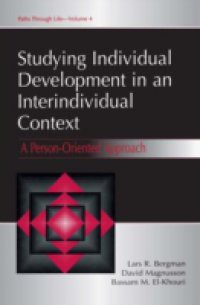During the last decade there has been increased awareness of the limitations of standard approaches to the study of development. When the focus is on variables and relationships, the individual is easily lost. This book describes an alternative, person-oriented approach in which the focus is on the individual as a functioning whole. The authors take as their theoretical starting points the holistic-interactionistic research paradigm expounded by David Magnusson and others, and the new developmental science in which connections and interactions between different systems (biological, psychological, social, etc.) are stressed. They present a quantitative methodology for preserving--to the maximum extent possible--the individual as a functioning whole that is largely based on work carried out in the Stockholm Laboratory for Developmental Science over the past 20 years. The book constitutes a complete introductory guide to the person-oriented approach. The authors lay out the underlying theory, a number of basic methods, the necessary computer programs, and an extensive empirical example. (The computer programs have been collected into a statistical package, SLEIPNER, that is freely accessible on the Internet. The empirical example deals with boys' school adjustment from a pattern perspective and covers both positive and negative adaptation.) Studying Individual Development in an Interindividual Context: A Person-Oriented Approach will be crucial reading for all researchers who seek to understand the complexities of human development and for their advanced students.

